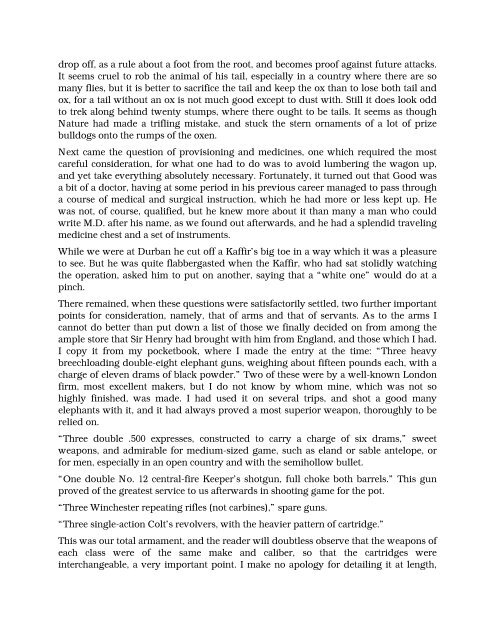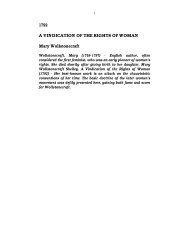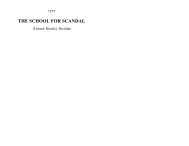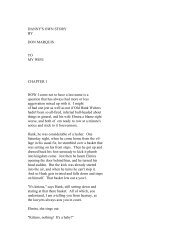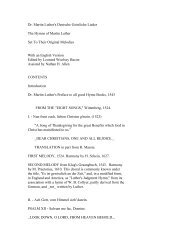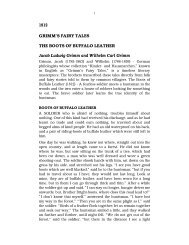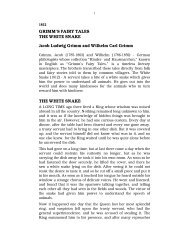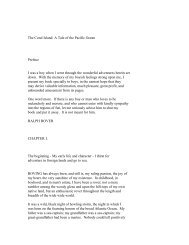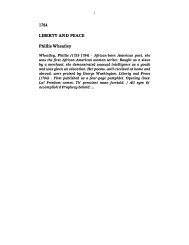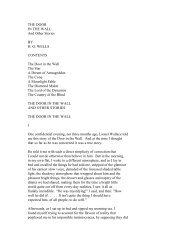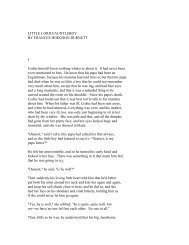1885 KING SOLOMON'S MINES H. Rider Haggard - Pink Monkey
1885 KING SOLOMON'S MINES H. Rider Haggard - Pink Monkey
1885 KING SOLOMON'S MINES H. Rider Haggard - Pink Monkey
Create successful ePaper yourself
Turn your PDF publications into a flip-book with our unique Google optimized e-Paper software.
drop off, as a rule about a foot from the root, and becomes proof against future attacks.<br />
It seems cruel to rob the animal of his tail, especially in a country where there are so<br />
many flies, but it is better to sacrifice the tail and keep the ox than to lose both tail and<br />
ox, for a tail without an ox is not much good except to dust with. Still it does look odd<br />
to trek along behind twenty stumps, where there ought to be tails. It seems as though<br />
Nature had made a trifling mistake, and stuck the stern ornaments of a lot of prize<br />
bulldogs onto the rumps of the oxen.<br />
Next came the question of provisioning and medicines, one which required the most<br />
careful consideration, for what one had to do was to avoid lumbering the wagon up,<br />
and yet take everything absolutely necessary. Fortunately, it turned out that Good was<br />
a bit of a doctor, having at some period in his previous career managed to pass through<br />
a course of medical and surgical instruction, which he had more or less kept up. He<br />
was not, of course, qualified, but he knew more about it than many a man who could<br />
write M.D. after his name, as we found out afterwards, and he had a splendid traveling<br />
medicine chest and a set of instruments.<br />
While we were at Durban he cut off a Kaffir’s big toe in a way which it was a pleasure<br />
to see. But he was quite flabbergasted when the Kaffir, who had sat stolidly watching<br />
the operation, asked him to put on another, saying that a “white one” would do at a<br />
pinch.<br />
There remained, when these questions were satisfactorily settled, two further important<br />
points for consideration, namely, that of arms and that of servants. As to the arms I<br />
cannot do better than put down a list of those we finally decided on from among the<br />
ample store that Sir Henry had brought with him from England, and those which I had.<br />
I copy it from my pocketbook, where I made the entry at the time: “Three heavy<br />
breechloading double-eight elephant guns, weighing about fifteen pounds each, with a<br />
charge of eleven drams of black powder.” Two of these were by a well-known London<br />
firm, most excellent makers, but I do not know by whom mine, which was not so<br />
highly finished, was made. I had used it on several trips, and shot a good many<br />
elephants with it, and it had always proved a most superior weapon, thoroughly to be<br />
relied on.<br />
“Three double .500 expresses, constructed to carry a charge of six drams,” sweet<br />
weapons, and admirable for medium-sized game, such as eland or sable antelope, or<br />
for men, especially in an open country and with the semihollow bullet.<br />
“One double No. 12 central-fire Keeper’s shotgun, full choke both barrels.” This gun<br />
proved of the greatest service to us afterwards in shooting game for the pot.<br />
“Three Winchester repeating rifles (not carbines),” spare guns.<br />
“Three single-action Colt’s revolvers, with the heavier pattern of cartridge.”<br />
This was our total armament, and the reader will doubtless observe that the weapons of<br />
each class were of the same make and caliber, so that the cartridges were<br />
interchangeable, a very important point. I make no apology for detailing it at length,


